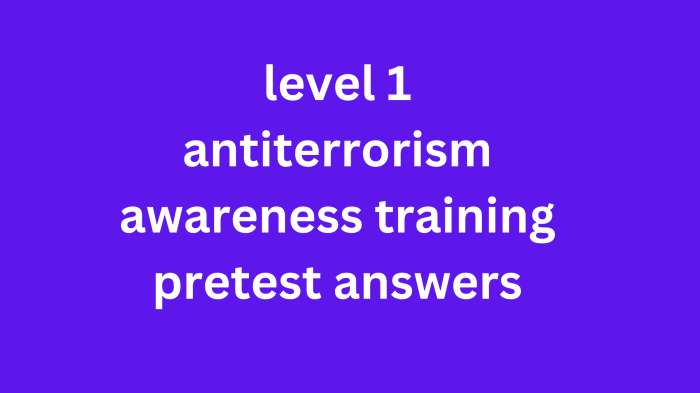Delving into level i antiterrorism awareness training pretest answers, this introduction immerses readers in a unique and compelling narrative, with a tone that is both engaging and thought-provoking from the very first sentence. This training is crucial for individuals seeking to enhance their understanding of terrorism and its impact, equipping them with the knowledge and skills to identify and report suspicious activities, implement protective measures, and contribute to community resilience.
Throughout this comprehensive guide, we will explore the fundamental concepts of terrorism awareness, the importance of situational awareness and vigilance, and the procedures for reporting suspicious activities to the appropriate authorities. We will also delve into personal safety measures to protect against terrorist attacks, strategies for mitigating risks, and the roles and responsibilities of different agencies and individuals in responding to a terrorist incident.
Level I Antiterrorism Awareness Training Overview
The Level I Antiterrorism Awareness Training aims to equip individuals with the knowledge and skills to recognize, prevent, and respond to terrorist threats. It is designed for a wide audience, including employees of critical infrastructure facilities, law enforcement officers, first responders, and members of the general public.
The training covers various modules, including:
- Understanding the nature of terrorism and its motivations
- Identifying and reporting suspicious activities
- Implementing protective measures to minimize risks
- Responding effectively to terrorist incidents
Terrorism Awareness

Terrorism is the unlawful use of violence or the threat of violence to intimidate or coerce governments or societies to achieve political, religious, or ideological goals.
Terrorist organizations are motivated by a range of factors, including:
- Ideological extremism
- Political grievances
- Economic deprivation
Terrorism can have devastating impacts on individuals, communities, and nations, including:
- Loss of life and injuries
- Economic damage
- Social unrest
Identifying and Reporting Suspicious Activities

Situational awareness and vigilance are crucial in preventing terrorism. Suspicious activities may include:
- Individuals taking photographs or making sketches of sensitive locations
- Vehicles parked in unusual places or for extended periods
- People wearing clothing or carrying items that are inconsistent with the weather or surroundings
If you observe suspicious activity, report it immediately to the appropriate authorities. Provide a detailed description of the activity, the individuals involved, and the location.
Protective Measures: Level I Antiterrorism Awareness Training Pretest Answers

Implementing personal safety measures can help minimize risks from terrorist attacks:
- Be aware of your surroundings and pay attention to unusual activities
- Avoid large crowds and public gatherings, especially during times of heightened security
- If you see something suspicious, leave the area immediately and report it to authorities
In the event of an attack:
- Stay calm and follow the instructions of law enforcement officers
- If possible, evacuate the area quickly and safely
- If you cannot evacuate, find a secure location and stay there until help arrives
Answers to Common Questions
What is the purpose of level I antiterrorism awareness training?
Level I antiterrorism awareness training aims to enhance individuals’ understanding of terrorism, its motivations, and its impact on individuals, communities, and nations. It also provides practical guidance on identifying and reporting suspicious activities, implementing protective measures, and contributing to community resilience.
Why is situational awareness important in antiterrorism efforts?
Situational awareness is crucial in antiterrorism efforts as it enables individuals to recognize and respond to potential threats. By paying attention to their surroundings, individuals can identify suspicious activities and behaviors, and take appropriate actions to mitigate risks.
What are some examples of suspicious activities that should be reported?
Suspicious activities that should be reported include unattended packages or luggage, individuals taking photographs or making sketches of sensitive areas, and unusual or aggressive behavior. It is important to trust one’s instincts and report any activity that raises concerns.